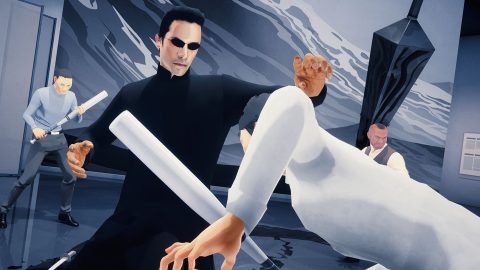The release of your debut album should be a big, exciting thing that you can go out and commemorate however you see fit. Right about now, New York’s Public Practice were meant to be finishing up a UK tour around the release of their first LP ‘Gentle Grip’. Then the coronavirus pandemic came along and put a spanner in the works. Like many other artists, the four-piece are now figuring out how to adapt to life during a pandemic.
“We’re going through a big cultural shift, which is a pretty weird time to be releasing records,” frontwoman Sam York sighs from her apartment. “We put a lot of work into this record and I’m excited to share it any way we can, but not being able to do shows is pretty heartbreaking as a performer.”
Over the last couple of years, Public Practice have made themselves an integral part of the New York DIY scene alongside the likes of Bodega, Future Punx and Pill. This isn’t any of the members’ first rodeo – York and guitarist Vince McClelland were formerly a part of promising post-punk group WALL, while bassist Drew Citron and drummer Scott Rosenthal were bandmates in Beverly. Given those projects, it’s unsurprising that this current outfit have become quietly renowned as one of the most exciting bands in the city, both on and off stage. Their songs and performances are theatrical and compelling, and are always ready to fuel a good time.
“That’s the biggest thing about this band,” York says. “We take making music seriously but we should only do this if we’re having fun. That’s the big driving force with this project – we wanna have fun.”
Pre-coronavirus, they’d already been doing a great job of maintaining that. October 2018 saw the release of their debut EP ‘Distance Is A Mirror’, which slinked and stomped through four slabs of jagged, enthralling punk. ‘Gentle Grip’ ups the fun stakes even more, moving into far groovier territory. It’s a shift in direction that, according to York, was inspired by the band’s nocturnal habits. “We like to go dancing as a group and going to parties that are specifically about music and dancing, and not just a dirty basement punk show,” she explains. “That has had a big place in my life too but it’s just where we at now.”
Dancing is something ‘Gentle Grip’ compels you to do, whether that’s through the tumbling, jerky rhythms of ‘Each Other’ or the grand shimmy of ‘My Head’. But be warned – it’s also an album that constantly switches up on you, songs veering off their expected course into something entirely different and constantly keeping you on your toes. “Philosophically, you always want to try and pull the rugs out from underneath your audience at least once in a song and take them to a surprising place,” McClelland says. “That’s something I want to explore more – how extreme can you get with that divergence of thought?”
The record is full of songs that mean everything and nothing. In the latter camp, there’s ‘How I Like It’, on which McClelland takes the lead, muttering out a series of lines about on-the-street encounters. “I don’t like writing lyrics whatsoever,” he admits. “I’m scared of it or something. So I was just mumbling things and it was like, ‘Alright, that sounds cool.’” When it came to mixing the track, he kept pushing for his vocals to be taken lower and lower because “you shouldn’t be able to hear any of the lyrics and it really shouldn’t make any sense.” “If you ever see us play a show and you can hear what I’m saying, tell the sound engineer to lower my vocals,” he adds with a soft chuckle.
On the other hand are songs like ‘Compromised’, which feels highly relevant to the time we’re living through. It tackles the conflict between our material desires and our want to care for the world around us, York acknowledging herself as part of the problem just like the rest of us. “I do want nice new things, but I also like to do what I believe is socially and environmentally responsible as much as possible,” she says. “Those are really conflicting ideals and I think figuring out how to balance that is becoming even more relevant with where we are now, not just in America but globally.”
The coronavirus pandemic, she notes, has forced us to “take a step back from consumerism” and re-evaluate what we need to be happy. For New Yorkers in particular, she’s spotted an immediate benefit to being stuck indoors all day. “It usually costs $100 just to walk out your door ‘cos you end up spending money – we call it a sidewalk tax.”
For McClelland, one of the big themes of the record, which thrives on disco grooves and syncopated rhythms, exists in this conceptual space. “Disco was about excess and being fancy and flashy,” he explains. “How do you bring people to this feeling of excess without having to actually buy all the junk? I think that’s where the album lives as far as its identity. It’s like let’s try to create a space where people have fun and can feel fabulous but not spend the money.”
Luckily, despite Public Practice unable to tour it right now, it’s a record that can still make you feel fabulous from the comfort of your own home, tearing down the walls around you and replacing them with big, glimmering hooks to bask in instead. Although the band hope to be able to get back on the road at some point (their UK tour has been rescheduled for September but they’re unsure whether it will go ahead), they’re also confident ‘Gentle Grip’ can provide some distraction in the meantime. “It feels like a studio project,” says McClelland. His next statement brings a broad grin to his bandmate’s face. “We’re like The Beatles in Abbey Road – here’s a record, we’re not touring it, enjoy it.”
While other artists have been going live online, the New Yorkers have mixed opinions about doing it themselves. York concedes that there are “a lot of cool, creative things that can be done with live-streaming”, but she can’t reconcile the idea of performing to a screen with the feeling of an actual gig. “Being on stage with lights and the energy of a room full of people is incredibly powerful,” she says. “That’s something that that simply does not happen with this kind of online interaction. I don’t think it’s comparable.”
As for what lies ahead for Public Practice beyond the next few months, the band themselves aren’t sure. McClelland has been using the time in isolation to work on new music, while York has been struggling to access her creativity. They’re also aware of how slow the return to physically being able to take in culture will be. “I genuinely can’t picture what the cultural landscape is gonna look like,” York sighs again. One thing she can promise is the band will “keep making music we believe in and feel happy and excited to perform and share.” No matter what the future looks like, at least we’ll have that.
The post Public Practice: NYC disco-punks’ boredom-busting debut is where Blondie meets B-52’s appeared first on NME Music News, Reviews, Videos, Galleries, Tickets and Blogs | NME.COM.







